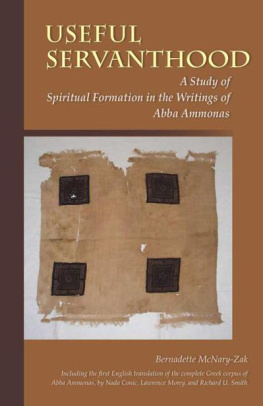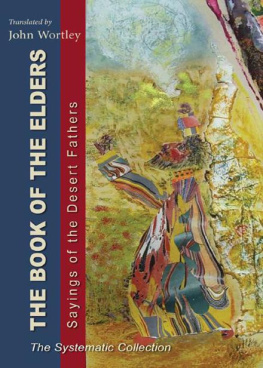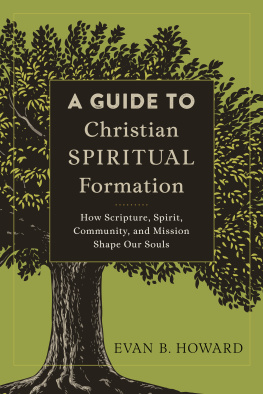CISTERCIAN STUDIES SERIES: NUMBER TWO HUNDRED TWENTY-FOUR
Bernadette McNary-Zak
Useful Servanthood
A Cistercian Publications title published by Liturgical Press
Cistercian Publications
Editorial Offices
Abbey of Gethsemani
3642 Monks Road
Trappist, Kentucky 40051
www.cistercianpublications.org
Excerpts from The Letters of Ammonas: Successor of St. Antony , trans. Derwas J. Chitty. SLG Press, 1979, Fairacres Publications 72. The Sisters of the Love of God, 1979. ISBN-10: 0-7283-0080-X. ISBN-13: 978-0-7283-0080-4. Ebook ISBN: 978-0-8790-7922-2.
Scripture texts in this work are taken from the New Revised Standard Version Bible 1989, Division of Christian Education of the National Council of the Churches of Christ in the United States of America. Used by permission. All rights reserved.
On the front cover: Fabric piece cut from a womans mantle or veil, The Rietz Coptic Textile Collection, California Academy of Sciences. Used with permission. All rights reserved. Cover design by Ann Blattner.
2010 by Order of Saint Benedict, Collegeville, Minnesota. All rights reserved. No part of this book may be reproduced in any form, by print, microfilm, microfiche, mechanical recording, photocopying, translation, or by any other means, known or yet unknown, for any purpose except brief quotations in reviews, without the previous written permission of Liturgical Press, Saint Johns Abbey, PO Box 7500, Collegeville, Minnesota 56321-7500. Printed in the United States of America.

Library of Congress Cataloging-in-Publication Data
McNary-Zak, Bernadette.
Useful servanthood: a study of spiritual formation in the writings of Abba Ammonas / Bernadette McNary-Zak; with the Greek corpus of Ammonas in English translation by Nada Conic, Lawrence Morey, and Richard Upsher Smith.
p. cm. (Cistercian studies series; no. 224)
Includes bibliographical references.
ISBN 978-0-87907-224-7 ISBN 978-0-87907-922-2 (e-book)
1. Ammonas, Saint, 4th cent. 2. Spiritual formation. I. Conic, Nada. II. Morey, Lawrence. III. Smith, Richard Upsher. IV. Ammonas, Saint, 4th cent. Selections. English V. Title. VI. Series.
BR65.A3276M36 2010
248.894dc22
2010020560
Contents
Preface
A brother asked Abba Ammonas, Give me a word, and the old man replied, Go make your thoughts like those of the evildoers who are in prison. For they are always asking when the magistrate will come, awaiting him in anxiety. Even so the monk ought to give himself at all times to accusing his own soul, saying, Unhappy wretch that I am. How shall I stand before the judgment seat of Christ? What shall I say to him in my defense? If you give yourself continually to this, you may be saved.
B y sharing stories like this one, Egyptian desert monks of the late fourth century preserved a collective memory of one of their best-remembered members, Abba Ammonas. Their primary intention, however, was less biographical than our modern sensibilities might imagine. Rather, their acts of preservation and transmission were shaped by deep convictions regarding the enduring tangibility of Abba Ammonas presence and the veracity of his words. This sayings ability to capture so compactly the ethos of desert monastic practice through its teasing, compelling sense of transparency, and simplicity, posed a real challenge to its audiences. As in other forms of wisdom literature, much of the potency operative in this saying was found in what lay behind and beyond the words. Indeed, it was the unspoken reality of desert monastic practice that animated the imaginations of Christians of late antiquity and prompted their queries. For many contemporary historians of early Christianity, their questions remain relevant. What was the experience that supplied Abba Ammonas and his fellow monks with a worldview that rested on a radical overturning of commonly perceived notions of happiness and judgment? How and why did Abba Ammonas know that this monk must adopt the same worldview? On what grounds was Abba Ammonas compelled to speak and the monk to listen?
Scholars have long addressed the nature, exercise, and role of spiritual formation in the context of desert monastic practice. This book applies the theoretical contributions of many of these studies to a presentation of the specific model of spiritual formation advanced by Abba Ammonas, a prominent fourth-century monastic leader whose extant writings remain largely unexamined. Given the nature of his monastic ties and the presence of a body of his writings, it remains striking that Abba Ammonas is an underrepresented figure in our study of early Christian monasticism. An examination of Abba Ammonas writings illumines how discernment, a spiritual gift pervasive in early monastic circles, was discussed and cultivated in a local context and so provides another lens for considering the relationship between mystical experience and monastic practice in the life of the early Christian community.
The book falls into two parts. The first part situates Abba Ammonas in his historical and theological contexts. It begins with a brief discussion of the nature of spiritual guidance in fourth-century Egyptian desert monastic practice in order to locate Abba Ammonas Letters, Instructions , and Exhortations and then proceeds to a systematic reconstruction of the model of spiritual formation found in these works. This is followed by a consideration of the contribution this model made in the contexts of Abba Ammonas monastic network and the local church community.
The second part of the book contains English translations of Abba Ammonas Letters, Instructions , and Exhortations as they survive in Greek. While there are French translations of these works, and an English translation of the Syriac Letters , the Greek manuscript tradition remains inaccessible to many readers; the translation of these texts is intended to add to the body of writings available.
Scholarship never takes place in isolation and I am grateful to many for their assistance in the construction of this book. I received gifts of funding and time at several critical periods. In a serendipitous sequence of events, a grant in the summer of 2003 from the Wabash Center for Teaching and Learning in Theology and Religion enabled me to focus attention on writing, and to do so in the context of dialogue and fellowship with colleagues whose contemporary work and lives were centered in one way or another on questions of discernment and community. I am especially grateful to Professor Susan Ashbrook Harvey and Rev. Dr. Paul O. Myhre for their help during this period. Further assistance was received in a course release in the fall 2004 semester through the generosity of a faculty development grant funded by the Andrew W. Mellon Foundation. I am especially grateful to my colleagues in the Religious Studies Department and in the Inter-disciplinary Humanities program at Rhodes College for their support at this time.
Public presentation of much of the scholarship in this book occurred in several forums. Audiences at annual and regional meetings of the American Academy of Religion, the Byzantine Studies Conference, and the International Congress of Medieval Studies in Kalamazoo, Michigan, challenged me to think with greater clarity and helped me to appreciate the value of Abba Ammonas thought in a broader context. Students in my undergraduate courses, past and present, may recognize some of this material as well; they have been an invaluable audience as they continue to help me to hone my teaching about monastic practice. Dr. E. Rozanne Elder, Fr. Mark Scott, and the anonymous readers at Cistercian Publications provided insightful readings and comments on an earlier version of the manuscript and translations. My mother, Tusa McNary, first drew my attention to the cover image. I am especially grateful to her for the conversations that led to its eventual selection, and to Dr. Russell Hartman and those in the Department of Anthropology at the California Academy of Sciences who made its use possible. Finally, my deepest thanks go to David.













